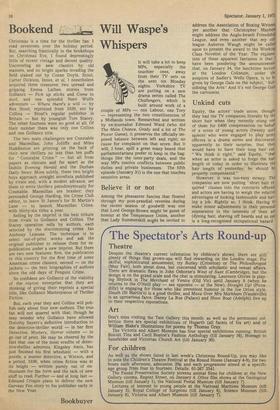Bookend
Christmas is a time for the thriller fan: read seventeen over the holiday period. But, searching frantically in the bookshops on Christmas Eve, I found depressingly little of recent vintage and decent quality. Uncovering no new classics by old masters, and no bright sparks invading the field staked out by Conan Doyle, Stout, Carter Dickson, Innes, et al, I nonetheless acquired three treasures: two unread and gripping Emma Lathen stories from Gollancz — Pick up sticks and Come to dust, and one splendid Nero Wolfe adventure — Where there's a will — by Rex Stout, reprinted from 1939, not by Collins — Stout's regular publisher in Britain — but by youngish Tom Stacey. The other fourteen were no good at all. Of their number there was only one Collins and one Gollancz title.
The two main challengers are Constable and Macmillan. John JoWife and Miles Huddleston are printing on the back of their new thrillers no less than ten puffs for "Constable Crime" — but all from papers as obscure and far apart as the Dublin Evening Herald and the Durban Daily Newc. More subtly, these two bright boys approach straight novelists published by rivals and, with a modest advance, set them to write thrillers pseudonymously for Constable. Macmillan are brasher: they persuaded George Harding, the Crime Club editor, to leave St James's for St Martin's Lane — to launch Macmillan Crime. with thirty-six titles a year. Selling by the imprint is the best tribute from rivals to Gollancz and Collins. The Stacey operation sells by authors, each selected by the discrimiriting -crime fan Anthony Lejeune. The technique is to select out-of-print works and ask the original publisher to release them for republication under a new imprint. But there are two new features: first, the publication in this country for the first time of some American crime classics; second — on the jackets — the best biographies of authors since the old days of Penguin Crime.
So confident are Gollancz of the viability of the reprint enterprise that they are thinking of giving their reprints a special title, like Gollancz Masterpieces of Thriller Fiction.
But, each year they and Collins will publish only about four new authors. The true fan will not quarrel with that; though he may wonder why Gollancz have allowed Dorothy Sayers's definitive introduction to the detective-thriller world — in her first Detection, Mystery, Horror volume — to go out of print. He may be cheered by the fact that one of the most erudite of detective-thriller admirers, Kingsley Amis, has just finished his first whodunit — with a puzzle, a master detective, a Watson, and a period, 1936, when crime fiction was at its height — written purely out of enthusiasm for the form and the lack of new stuff to read. Further — and at long last — Edmund Crispin plans to deliver the new Gervase Fen story to his publisher early in the New Year.
Bookbuyer














































 Previous page
Previous page